| Listing 1 - 10 of 15 | << page >> |
Sort by
|
Book
ISBN: 0691060053 9780691060057 Year: 1970 Publisher: Princeton, N.J. Princeton University Press
Abstract | Keywords | Export | Availability | Bookmark
 Loading...
Loading...Choose an application
- Reference Manager
- EndNote
- RefWorks (Direct export to RefWorks)
Non-fiction --- Satire --- History and criticism. --- Satire - History and criticism.
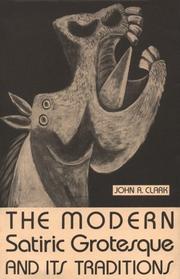
ISBN: 0813117445 1322601038 0813161355 9780813117447 081315619X Year: 1991 Publisher: Lexington, Ky University Press of Kentucky
Abstract | Keywords | Export | Availability | Bookmark
 Loading...
Loading...Choose an application
- Reference Manager
- EndNote
- RefWorks (Direct export to RefWorks)
Thomas Mann predicted that no manner or mode in literature would be so typical or so pervasive in the twentieth century as the grotesque. Assuredly he was correct. The subjects and methods of our comic literature (and much of our other literature) are regularly disturbing and often repulsive -- no laughing matter.In this ambitious study, John R. Clark seeks to elucidate the major tactics and topics deployed in modern literary dark humor. In Part I he explores the satiric strategies of authors of the grotesque, strategies that undercut conventional usage and form: the de-basement of heroes, the
Thematology --- anno 1900-1999 --- Grotesque in literature. --- Satire --- History and criticism. --- Satire - History and criticism.
Book
ISBN: 0691013063 0691619417 1400849772 0691060053 9781400849772 9780691619415 9780691013060 Year: 2015 Publisher: Princeton, NJ
Abstract | Keywords | Export | Availability | Bookmark
 Loading...
Loading...Choose an application
- Reference Manager
- EndNote
- RefWorks (Direct export to RefWorks)
Literary satire assumes three main forms: monologue, parody, and narrative (some fictional, some dramatic). This book by Gilbert Highet is a study of these forms, their meaning, their variation, their powers. Its scope is the range of satirical literature-from ancient Greece to modern America, from Aristophanes to Ionesco, from the parodists of Homer to the parodists of Eisenhower. It shows how satire originated in Greece and Rome, what its initial purposes and methods were, and how it revived in the Renaissance, to continue into our own era.Contents: Preface. I. Introduction. II. Diatribe. III. Parody. IV. The Distorting Mirror. V. Conclusion. Notes. Brief Bibliography. Index.Originally published in 1962.The Princeton Legacy Library uses the latest print-on-demand technology to again make available previously out-of-print books from the distinguished backlist of Princeton University Press. These editions preserve the original texts of these important books while presenting them in durable paperback and hardcover editions. The goal of the Princeton Legacy Library is to vastly increase access to the rich scholarly heritage found in the thousands of books published by Princeton University Press since its founding in 1905.
Satire --- History and criticism. --- History and criticism --- Histoire et critique --- Satire - History and criticism.
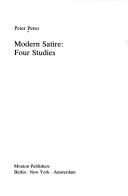
ISBN: 9027931801 9789027931801 Year: 1982 Volume: 27 Publisher: Berlin,New York : Mouton,
Abstract | Keywords | Export | Availability | Bookmark
 Loading...
Loading...Choose an application
- Reference Manager
- EndNote
- RefWorks (Direct export to RefWorks)
Satire --- Fiction --- Roman --- History and criticism --- Histoire et critique --- Satire - History and criticism --- Fiction - 20th century̨ - History and criticism
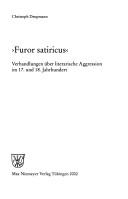
ISBN: 3484181664 3111817008 3110909537 9783484181663 Year: 2002 Volume: 166 Publisher: De Gruyter, Inc.
Abstract | Keywords | Export | Availability | Bookmark
 Loading...
Loading...Choose an application
- Reference Manager
- EndNote
- RefWorks (Direct export to RefWorks)
Aggressive Schreibweisen - Polemik, Invektive, vor allem aber "Satire" - sind seit der Antike einem Rechtfertigungsdruck ausgesetzt, der letztlich im Tabu der Kultur über Gewalt wurzelt. Die vorliegende Arbeit versteht Theoriebildung und Praxis "satirischen" Schreibens als Resultate einer produktiven Kraft dieses Aggressionstabus, die ein - über zwei Jahrhunderte verfolgtes - kulturelles Verhandlungsgeschehen in Gang setzt. Sie nimmt damit einen methodologischen Leitbegriff beim Wort, den das literaturgeschichtliche Denken des New Historicism eingeführt hat: Grenzen und Lizenzen "satirischen" Schreibens gilt es im (oft kontroversen) Dialog mit gesellschaftlichen Mächten erst auszuhandeln. In einer Reihe von "Korrelationsgeschichten" wird den vielfältigen Verknüpfungen literarischer, poetologischer und außerliterarischer Diskurse und Praktiken auf Schauplätzen nachgegangen, auf denen sonst einander fremde Instanzen im symbolischen Haushalt der Kultur miteinander kommunizieren: Literatur und Poetik mit dem Recht, der Medizin, der Pädagogik, der "Psychologie" und der Theologie ihrer Zeit. Die "extensiven" Rekonstruktionen werden durch drei intensive Analysen literarischer Texte abgerundet, die solche Verhandlungen in sich selbst austragen und zugleich deren Unabschließbarkeit dokumentieren: Christian Thomasius' »Ostergedancken« (1695), ein Stück aus Bodmer/Breitingers »Mahler der Sitten« (1746) und Theodor Haeckers »Dialog über die Satire« (1927).
Book
ISBN: 2862274879 9782862274874 Year: 2006 Publisher: Paris Editions Alternatives
Abstract | Keywords | Export | Availability | Bookmark
 Loading...
Loading...Choose an application
- Reference Manager
- EndNote
- RefWorks (Direct export to RefWorks)
Satire --- La Bible --- --Caricature --- --Religion --- --Anticléricalisme --- --History and criticism --- Satire - History and criticism --- Caricature --- Religion --- Anticléricalisme --- Bible --- Drawing --- humor --- bijbel --- beeldverhalen
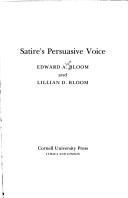
ISBN: 0801408393 9780801408397 Year: 1979 Publisher: Ithaca, N.Y.
Abstract | Keywords | Export | Availability | Bookmark
 Loading...
Loading...Choose an application
- Reference Manager
- EndNote
- RefWorks (Direct export to RefWorks)
What is satire ? What can it accomplish ? Why does it make us laugh ? These are the concerns of this literate and urban book.
English literature --- Thematology --- Persuasion (Rhetoric) --- Satire --- History and criticism --- -Persuasion (Rhetoric) --- Forensics (Public speaking) --- Oratory --- Rhetoric --- Comic literature --- Literature --- Wit and humor --- Invective --- History and criticism. --- Persuasion (Rhetoric). --- Satire - History and criticism --- SATIRE --- HISTOIRE ET CRITIQUE
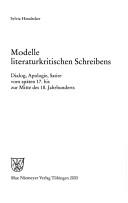
ISBN: 3484181796 3110915456 9783484181793 Year: 2005 Volume: 179 Publisher: Max Niemeyer Verlag
Abstract | Keywords | Export | Availability | Bookmark
 Loading...
Loading...Choose an application
- Reference Manager
- EndNote
- RefWorks (Direct export to RefWorks)
Die Studie verfolgt die frühe Entwicklung literaturkritischen Schreibens in deutscher Sprache im Zeichen der Aufklärung. Anders als üblich beschränkt sie sich nicht auf das Genre Rezension, sondern wählt nach inhaltlich-strukturellen Kriterien Texte aus, die auf Aspekte des gesamten literarischen Lebens kritisch reflektieren (iudicium). Literaturkritisches Schreiben bezieht sich somit auf die wertende Beschäftigung mit gelehrter, aber auch mit unterhaltender Literatur sowie mit Dichtung und ihren Kontextbedingungen (res publica litteraria, "literarische Öffentlichkeit"). Im Untersuchungszeitraum wird das literaturkritische Schreiben als Prozess erkennbar, in dem der zeittypische kritisch-gelehrte Impetus auf bewährte literarische Textmuster zugreift. Dialog, Apologie und Satire sind besonders produktive Modelle, da sie die Möglichkeit zur kontroversen Meinungsäußerung bieten und zugleich Publikumswirksamkeit versprechen. Die literaturhistorisch eingebetteten Beispielanalysen legen offen, wie die noch heute spezifische dialogische Grundstruktur der Literaturkritik oder der Verriss entstehen. Die Studie dokumentiert eine weit differenziertere Entwicklung der journalistisch-literarischen Kritik als oftmals angenommen. Neben Thomasius oder Lessing treten bislang weniger bekannte Autoren wie Johann Rist, Erasmus Francisci, Nicolaus Hieronymus Gundling oder Christian Ludwig Liscow als bedeutende Wegbereiter der Literaturkritik hervor.
Dialogue --- Discourse analysis, Literary --- Dialogue analysis --- Satire --- German literature --- History and criticism --- LITERARY CRITICISM / European / German. --- Satire - History and criticism --- German literature - 18th century - History and criticism --- German literature - 17th century - History and criticism
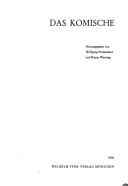
ISBN: 3770514114 9783770514113 Year: 1976 Volume: 7 Publisher: München Fink
Abstract | Keywords | Export | Availability | Bookmark
 Loading...
Loading...Choose an application
- Reference Manager
- EndNote
- RefWorks (Direct export to RefWorks)
Literature --- Comic, The --- Irony --- Satire --- Congresses --- History and criticism --- -Irony --- -Satire --- -#gsdbf --- Comic literature --- Wit and humor --- Invective --- Sarcasm --- Cynicism --- Rhetoric --- Tragic, The --- Understatement --- Ludicrous, The --- Ridiculous, The --- Comedy --- -Congresses --- Congresses. --- #gsdbf --- History and criticism&delete& --- Comic, The - Congresses --- Irony - Congresses --- Satire - History and criticism - Congresses
Book
ISBN: 9029039779 9063032862 9789063032869 Year: 1993 Volume: 1053 Publisher: Amsterdam : Leuven : Meulenhoff ; Kritak,
Abstract | Keywords | Export | Availability | Bookmark
 Loading...
Loading...Choose an application
- Reference Manager
- EndNote
- RefWorks (Direct export to RefWorks)
History of Europe --- Comparative literature --- Reinaert --- Geschiedenis van de Middeleeuwen --- Histoire du Moyen Age --- Littérature néerlandaise --- Nederlandse letterkunde --- 839.3 "12" REINAERT --- Nederlandse literatuur--?"12"--REINAERT --- Literature, Medieval --- Reynard the Fox (Legendary character) --- Satire --- History and criticism. --- 839.3 "12" REINAERT Nederlandse literatuur--?"12"--REINAERT --- Reynard the Fox (Legendary character). --- Reinaert de Vos (Legendary character) --- Reinke de Vos (Legendary character) --- Renart (Legendary character) --- Legends --- History and criticism --- Literature, Medieval - History and criticism --- Satire - History and criticism
| Listing 1 - 10 of 15 | << page >> |
Sort by
|

 Search
Search Feedback
Feedback About UniCat
About UniCat  Help
Help News
News